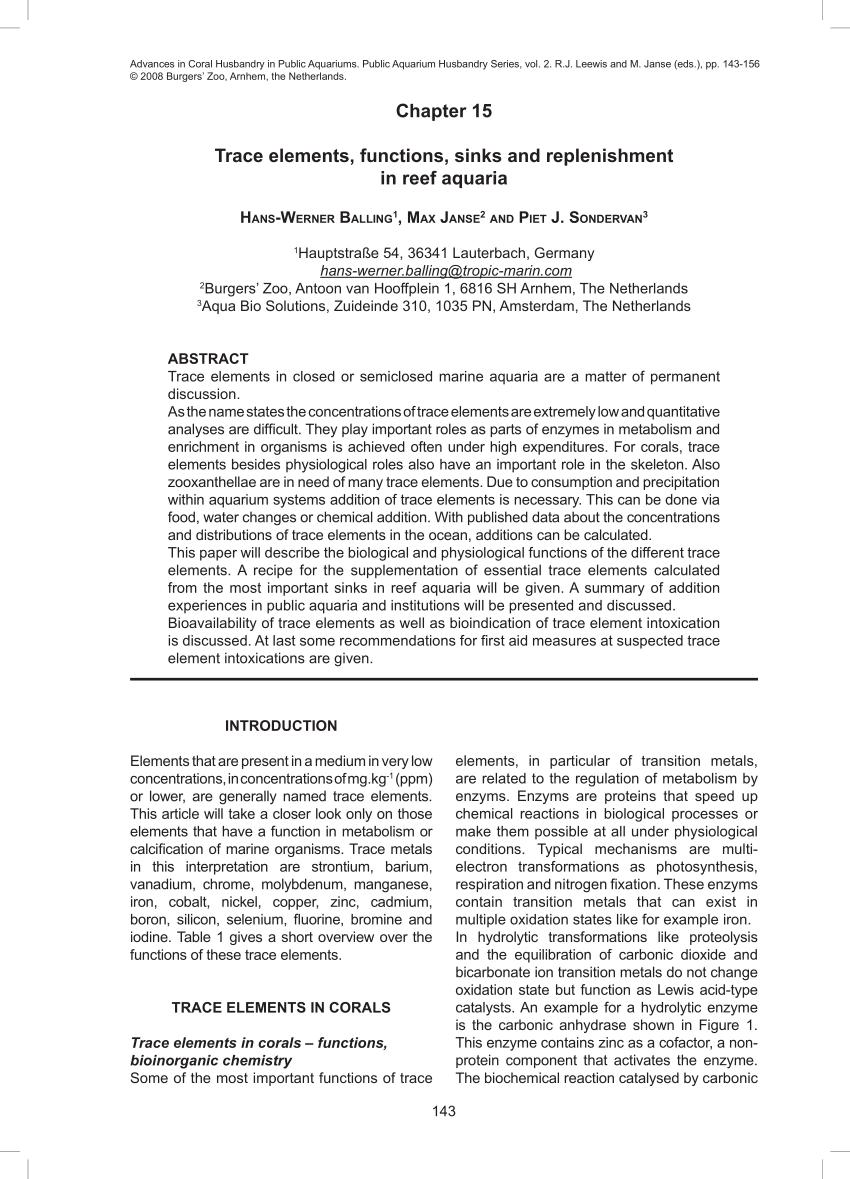Randy Holmes-Farley
Reef Chemist
View Badges
Staff member
Super Moderator
Excellence Award
Expert Contributor
Article Contributor
R2R Research
My Tank Thread
I don't know whether you are aware which huge change, maybe progress, such a statement made by someone like you is.
In the 2000s and 2010s our sells of K+ Elements did stay well behind the sells of A- Elements in the USA. The only reason for this was the scepticism stirred up by Ron Shimek. This scepticism against "heavy metals" (transition metals is better) is still quite present among many reefers.
What All-For-Reef and maybe a few other calcium and alkalinity products did, was introducing these essential trace elements "through the backdoor". I think this approach was very successfull, at least in my eyes.
ICP-OES helped to enshure and show that no excessively high concentrations were achieved. This is the real advantage and meaning of ICP-OES analysis and control, not to show that some minimum or optimum concentration was achieved. In my eyes, to tell something else is not really serious.
I have no complaint as yet, that corals or other animals were seriously affected or harmed by high trace element concentrations dosed with All-For-Reef or any other of our products. But I don't have these information about any other product or method as yet. Do you, @Randy Holmes-Farley ?
So, does this mean all the warnings have been completely unfounded?
If someone wants to know about the background, I recommend to think a bit about dynamic equilibria and steady state concentrations.
Just as strontium cannot be totally depleted since incorporation rate depends on the strontium concentration, it is hard to achieve and keep high elevated concentrations of many other trace elements, well, just because incorporation rates depend on concentrations. This means after quite a short time, weeks or a few months, most dosed trace elements will reach dynamic equilibria/steady state concentrations and will not increase further in concentrations despite continued and consistent dosing.
I think, to understand this conception is really central in understanding trace elements. This is what balanced trace elements supply means to me, to keep these steady state concentrations at reasonable levels. This is why a product may work without further control and you wonder why and how.
I do not recall ever saying that the trace elements in AFR were not useful or beneficial, but that seems to be the crux of your argument. I am not saying anyone's tank crashed because of trace elements in AFR. No ones tank has demonstrably crashed from not dosing any trace elements at all.
I am simply saying they cannot be optimal for all reef aquaria when based on calcification or mL per day. You may not agree.
It is neither a new thought, nor an unreasonable one. I have been making and publishing concerns about trace element supplements that use either of the two common schemes (tied to mL per day or tied to calcification) for many years.
In 2015, I posted this here at Reef2Reef:
"FWIW, I'm not sure the need for many trace elements is related to calcification alone, so I'd be reluctant to tie the dosing of trace elements to the need for calcium and alkalinity.
For example, macroalgae and soft corals use little calcium and alkalinity, but may take up more trace elements than hard corals since they may add tissue mass faster.

FM Trace Elements with Randys Recipe
Has anyone worked out mixing ratio if i were to use the 3 Fauna Marin Trace Elements in Randys Recipe?
 www.reef2reef.com
www.reef2reef.com
Heres' what I published in 2007 (before people had easy access to any type of icp) about an mL per day trace element supplement, which suffers a similar criticism from me (although for a different reason) than one based on calcification:
"But what is the evidence that more is good? Despite no intentional additions, my aquarium has levels of copper well above natural seawater. How does Kent know that my organisms would benefit from more? And how did Kent determine the relative amounts of different ions in this supplement? What are those amounts? If I did want one of these, how do I know I’m getting enough?
To me this seems like playing a chess game with every piece rigidly connected. They all move together, whether you want them to or not. Worse yet, you don’t know what the move actually is because Kent decided, but does not reveal it to you. It seems like a poor way to manage an aquarium.
In short, I do not recommend trace element mixtures. If you believe that you need (or want to experiment with) trace elements (such as iron or manganese), my suggestion is to use single additives of known concentrations."














